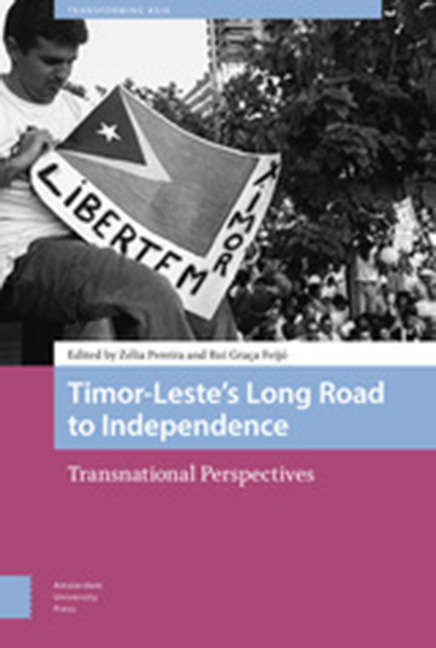Book contents
- Frontmatter
- Contents
- Acknowledgements
- A Note on the Name of the Country
- List of Figures
- Introduction: Timor-Leste’s Long Road to Independence: Outline for an Analytical Framework
- Part One Before The Portuguese Decolonisation
- Part Two The Portuguese Revolution Arrives In Timor-Leste
- Part Three Reaction To The Indonesian Invasion Of Timor-Leste
- Part Four Resisting The Indonesian Annexation Of Timor-Leste
- Index
8 - “Reduce the Pressure on the Indonesians”: Australian Timor Policy at the UN, 1975–1982
Published online by Cambridge University Press: 14 February 2024
- Frontmatter
- Contents
- Acknowledgements
- A Note on the Name of the Country
- List of Figures
- Introduction: Timor-Leste’s Long Road to Independence: Outline for an Analytical Framework
- Part One Before The Portuguese Decolonisation
- Part Two The Portuguese Revolution Arrives In Timor-Leste
- Part Three Reaction To The Indonesian Invasion Of Timor-Leste
- Part Four Resisting The Indonesian Annexation Of Timor-Leste
- Index
Summary
Abstract
After the Indonesian invasion of Timor-Leste the UN emerged as a battleground regarding the status of the country. The failure of the international community to sanction an Indonesian takeover strengthened the Timorese resistance. In the early years of occupation there were two Security Council resolutions on Timor-Leste and eight in the General Assembly (1975 to 1982), all directly or implicitly critical of the Indonesian occupation. During these years Timor-Leste's neighbour Australia moved from reluctantly expressing concern about the invasion, to abstention, and then to a no vote, accompanied by energetic lobbying on behalf of the Suharto regime to remove the Timor issue from the UN agenda. This chapter examines how Australia implemented such lobbying and the narrative it used to excuse the Indonesian actions, cover up Indonesian atrocities and deny the reality of the humanitarian crisis unfolding in Timor-Leste.
Keywords: Australia, UN, UNGA, denial, propaganda
A key international battleground regarding the issue of Timor-Leste during the occupation was the United Nations (UN). While some UN activity on Timor-Leste continued throughout, actual resolutions came principally in two stages, the years 1975 to 1983, and the series of Security Council resolutions in 1999 which supported the UNAMET, INTERFET and UNTAET interventions. This chapter examines the former period. These were the years when the worst of the human rights violations occurred and during which the risk of failure at the UN, and consequent international acceptance of Indonesian sovereignty, was at its greatest.
There were two Security Council resolutions passed on Timor-Leste in 1975 and 1976 and eight at the General Assembly from 1975 to 1982, all of them supportive of self-determination and directly or implicitly critical of the occupation. The continued passage of these resolutions provided impetus to supporters of East Timorese self-determination and proved a hindrance to Indonesian efforts to portray incorporation as irreversible. With the vote narrowing as the years progressed, the resolutions carried with them a risk that a defeat would be seen to validate Indonesian claims, severely damaging the East Timorese claim to the right to self-determination.
This chapter examines how, in a situation in which many countries looked to Australia (as a democracy and a close neighbour to Timor-Leste) as a source of leadership on the issue, Australia used its position to work with the Suharto regime to prevent the kind of scrutiny that would have undermined its goals of subjecting and incorporating the territory.
- Type
- Chapter
- Information
- Timor-Leste's Long Road to IndependenceTransnational Perspectives, pp. 251 - 276Publisher: Amsterdam University PressPrint publication year: 2023

